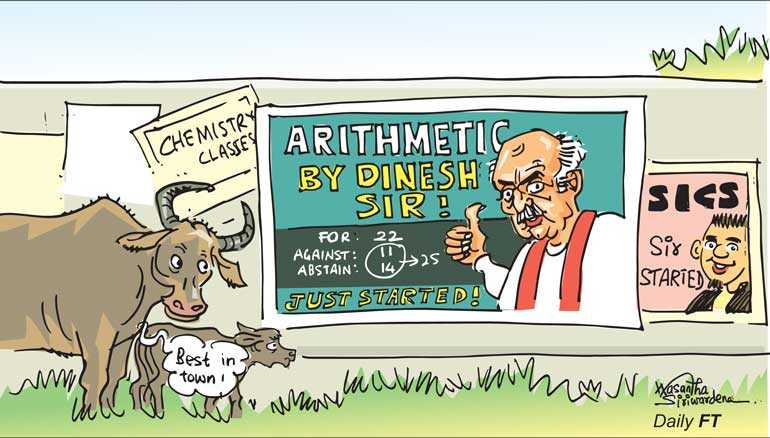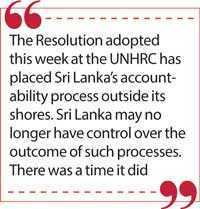Saturday Feb 21, 2026
Saturday Feb 21, 2026
Thursday, 25 March 2021 00:00 - - {{hitsCtrl.values.hits}}

 UNHRC Resolution 46-L1/Rev1, which was adopted on Tuesday 23 March, had an interesting inclusion after the third informal session on the draft. Resolution S-11/1 of 2009 was recalled for the first time in a UNHRC resolution 12 years after it was first adopted, to emphasise Sri Lanka’s resolve to seek a political settlement, and to highlight the endorsement of the Joint Communique between then President Mahinda Rajapaksa and then UN Secretary General Ban Ki-moon on the importance of accountability.
UNHRC Resolution 46-L1/Rev1, which was adopted on Tuesday 23 March, had an interesting inclusion after the third informal session on the draft. Resolution S-11/1 of 2009 was recalled for the first time in a UNHRC resolution 12 years after it was first adopted, to emphasise Sri Lanka’s resolve to seek a political settlement, and to highlight the endorsement of the Joint Communique between then President Mahinda Rajapaksa and then UN Secretary General Ban Ki-moon on the importance of accountability.
Resolution 46-L1/Rev1 gives an incorrect date of the Joint Communique as 26 May 2009. The correct date is 23 May 2009. However, the resolution correctly cites the Joint Communique, when it says “in which the Secretary-General, inter alia, underlined the importance of an accountability process”.
In order to properly understand where Sri Lanka is at now, and to make decisions about what should be done, it is necessary not to deliberately misunderstand this joint communique or the 2009 resolution and indeed subsequent resolutions.
When the 2009 draft resolution was being negotiated in Geneva only a few days after the end of the war, despite enormous pressure from the pro-LTTE groups in Europe and the EU’s attempt to introduce a war crimes inquiry, the word ‘accountability’ was not included in it until 24 May, two days before the Special session. The many co-sponsors of Sri Lanka’s resolution had agreed with that position. This was because only days after the end of the war, there was an attempt to discredit the entire war, claiming that Sri Lanka had committed violations of international humanitarian law, including widespread war crimes as policy, deliberately targeting civilians and engaging in ‘genocide’. This overreach by some Tamil diaspora and other groups, including ‘war crimes’ in the EU draft, made it possible for the Sri Lankan representatives to convince many in the Council that it was not in the best interest of the post-war process to endorse this language.
However, when a Joint Communique was drafted and signed in Colombo at the end of the visit of the UN Secretary-General, there was no question that there would be insistence that it be included in the Sri Lankan Resolution. Drafting the Joint Communique in Colombo for Sri Lanka were experienced diplomats. Overseeing the process were Ambassador H.M.G.S. Palihakkara, Sri Lanka’s then Permanent Representative to the UN in New York who had accompanied the UN Secretary General to Colombo, and Dr. Palitha Kohona, Secretary, Ministry of Foreign Affairs.
What did the text of the communique actually say? Remembering that a Joint Communique includes the views of two or more parties, it is however important to note that they may not align exactly in every aspect. That is why the statement specifically mentions, “The Secretary-General underlined the importance of an accountability processes…The Government will take measures to address those grievances.” The two views are compatible and complementary, but not identical. The GoSL left open the processes and mechanisms they would employ to address the concerns of the Secretary-General.
 Lack of domestic mechanisms
Lack of domestic mechanisms
The LLRC and the Paranagama Commission as is well known, came to the conclusion that there were no “system crimes” committed during the armed conflict. The Paranagama Commission in particular went into great detail to examine the laws of war crimes, genocide, violation of international humanitarian law, examining the experience of other countries where the UN had investigated such crimes. The LLRC identified some individual cases which it thought needed to be investigated, and listed them. The Paranagama Commission report proposed several options for similar accountability mechanisms.
The 2021 OHCHR report however finds these reports inadequate. The 2021 resolution, in its operative paragraph 5 (OP5) prepares the ground for OP6, which is the most significant of the resolution. OP5 states: “Notes the persistent lack of accountability of domestic mechanisms…” echoing the OHCHR report presented at the 46th session which says: “Given the failure of domestic mechanisms to conduct credible investigations…”
The very fact that Sri Lanka had done no work on the accountability recommendations of either reports, nor had presented them at the Council as domestic options for consideration, had left the reports very much orphaned and open to criticism in the High Commissioner’s report.
Commenting on the LLRC report, it says “…does not adequately address serious allegations of violations of international law,” but calls on the Government to implement “constructive recommendations” made by LLRC.” As for the Paranagama report, it says: “In August 2013, the then President of Sri Lanka appointed a further Commission to investigate complaints regarding missing persons (the “Paranagama Commission”), which also failed to credibly establish the truth, ensure accountability and provide redress to victims.”
Notwithstanding the High Commissioner’s critique, these reports were valuable resources for Sri Lanka to “address those grievances” as declared in the Joint Communique, and had it done so, were likely to have prevented continuous resolutions being brought on the issue. Instead, something far more egregious happened later.
The 2015 Co-sponsorship of Resolution 30/1
The 2021 OHCHR report describes the events in paragraph 14:
“Given the failure of domestic mechanisms to conduct credible investigations, in March 2014, the Human Rights Council requested OHCHR in resolution 25/1 to undertake a comprehensive investigation. The report of the OHCHR investigation on Sri Lanka (OISL), released in September 2015, found credible evidence that both Sri Lankan security forces and LTTE were responsible for war crimes and crimes against humanity.”
By this time, Sri Lanka had several sources that had already challenged this assertion that GoSL had committed war crimes and crimes against humanity, the Paranagama report being one which specifically dealt at length with these allegations. Considering that one of the authors was Sir Desmond de Silva QC, United Nations Chief War Crimes Prosecutor in Sierra Leone who had a wealth of experience in this area, and that an annexure was authored by Sir John Holmes, former commander of Britain’s SAS, that conclusion was something GoSL could have immediately contested in 2015.
Instead, the 2021 OHCHR report describes in the next paragraph, what happened:
“It was at this juncture that a national unity Government, formed in January 2015, made important commitments to confront the past, strengthen democratic and independent institutions, and end impunity. These were embodied in its co-sponsoring of Human Rights Council resolution 30/1…”
What did Resolution 30/1 say with regard to accountability? What did Sri Lanka sign up to in 2015? In the first Operative paragraph (OP1) it says:
“Takes note with appreciation of the oral update presented by the United Nations High Commissioner to the Human Rights Council at its twenty-seventh session, the report of the Office of the High Commissioner on promoting reconciliation and accountability in Sri Lanka and its investigation on Sri Lanka requested by the Human Rights Council in its resolution 25/1, including its findings and conclusions, and encourages the Government of Sri Lanka to implement the recommendations contained therein…”
So, for the first time, Sri Lanka associated itself in 2015 with ‘appreciating’ the findings of the OHCHR report that said there was “credible evidence of war crimes” committed by the government, when it could not have established it with credible evidence, of intent to commit such violations against a civilian population.
Also, for the first time, Sri Lanka signed up in 2015 to foreign judges in accountability mechanisms. In OP6 of Resolution, it says:
“…notes with appreciation the proposal of the Government of Sri Lanka to establish a judicial mechanism with a special counsel to investigate allegations of violations and abuses of human rights and violations of international humanitarian law, as applicable… and also affirms in this regard the importance of participation in a Sri Lankan judicial mechanism, including the special counsel’s office, of Commonwealth and other foreign judges, defence lawyers and authorised prosecutors and investigators”.
For those who cheer the co-sponsorship of the 2015 resolution as a stroke of genius, while bringing up the Joint Statement of 23rd May 2009 as the one that internationalised accountability, a more attentive reading will show how Resolution 30/1 takes accountability to a whole new level, endorsing allegations of war crimes and foreign judges.
In Sir Desmond de Silva’s own words, communicated in a personal email dated October 30th 2017 in a positive response to one of my newspaper articles, he says “2 former chief prosecutors of international war crimes tribunals appointed personally by the Secretary General of the UN and a General who commanded the SAS , working with the Paranagama Commission could, having analysed all available evidence from non Sri Lankan government sources, provide evidence that that the allegation made in the Darusman Report of 40,000 civilians killed in the final phase of the war was a 'myth'… 40,000 civilians killed is a genocidal figure.” Sir Desmond felt that the then Foreign Minister “collaborated in the acceptance of that figure by co-sponsoring the Geneva Resolution which was based on the Darusman allegations… the FM of Sri Lanka gives every indication of accepting the underlying assertions in the Darusman Report.”
 2021 Resolution
2021 Resolution
The most significant development with regard to accountability in the latest resolution is in OP6. The emphasis has moved to the OHCHR itself intervening to gather data:
“…preserving and analysing evidence relating to violations and abuses of human rights and related crimes in Sri Lanka with a view to advancing accountability, and decides to strengthen in this regard the capacity of the Office of the High Commissioner to collect, consolidate, analyse and preserve information and evidence and to develop possible strategies for future accountability processes for gross violations of human rights or serious violations of international humanitarian law in Sri Lanka, to advocate for victims and survivors, and to support relevant judicial and other proceedings, including in Member States, with competent jurisdiction.”
Here, it introduces a new mechanism, to collect and preserve data outside of Sri Lanka, for later use if needed, in accountability processes including under universal jurisdiction.
However, it also “calls upon” (terminology that expects action) to “ensure the prompt, thorough and impartial investigation and, if warranted, prosecution of all alleged crimes relating to human rights violations and serious violations of international humanitarian law, including for longstanding emblematic cases…”
Who is responsible?
In devising the new mechanism and reporting on Sri Lanka, the OHCHR is likely to be guided by a document named ‘Who’s responsible? Attributing individual responsibility for violations of international human rights and humanitarian law in United Nations commissions of inquiry, fact-finding missions and other investigations’ published in 2018 by the Office of the High Commissioner. The document says:
“Accusing a person of violating human rights or of responsibility for crimes under international law, in any context, is a serious matter. Pointing a finger at someone in the context of an official United Nations investigation is even more so because the accusation bears the emblem of the United Nations. Individuals are entitled to a presumption of innocence as a fundamental human right. That notwithstanding, mandating bodies have repeatedly requested investigative bodies to undertake such identification as a weapon in the fight against impunity, and the mandated investigations are complying.”
Considering that the emphasis in the latest report of the High Commissioner as well as the new resolution is more on “emblematic cases” rather than the previous overreach of “system crimes”, it is likely that it is in this area of individual responsibility that resources will be allocated. It is also where an outcome is more likely to be achieved.
Who’s afraid of accountability?
The first resolution alleging war crimes against Sri Lanka was proposed in 2006, well before the end of the war. That was taken off the table in 2007, when the Sri Lankan Ambassador/PR challenged the co-sponsors to bring it on or take it off the table. They took it off. This was what Sri Lanka objected to during that period of the war, 2007 to 2009, vigorously defending Sri Lanka against unsubstantiated claims of widespread system crimes. Sri Lanka was able to gain the support of a majority of members of the Council for its own resolution after the end of the war, because it never tried to make out that ‘accountability’ as a universal principle was anathema.
Should there be no accountability? Those who have suffered the effects of violent conflict and terrorism deserve answers and some form of closure. Accountability processes, whether they proceed to prosecution or not, is one way of providing the redress they seek. The Paranagama report says that “The obligation to prosecute in all circumstances has not yet become a part of customary international law.” That report went on to suggest options of dealing with accountability:
“While noting that the UN Charter places peace and security at a higher level than justice, this Commission is of the view that in order to achieve peace and reconciliation the issue of accountability on all sides of the conflict must be addressed. It is for the political authorities to determine whether a South African-style Peace and Reconciliation Commission without prosecution is the most appropriate mechanism or if the Sierra Leonean model of combining the prosecution of those ‘who bear the greatest responsibility’ coupled with a Truth and Reconciliation Commission will better meet Sri Lanka’s post conflict needs.”
Even today, people affected by the first act of terrorism since the armed conflict, the Easter massacre, are crying out for answers, and demand accountability. Pope Benedict, writing on the beatitude ‘Blessed are those who mourn’ says “Even though it is not in their power to change the overall situation, they still counter the dominion of evil through the passive resistance of their suffering, through the mourning that sets bounds to the power of evil.” (Jesus of Nazareth, 2007)
In 2009 in Geneva, not resorting to blanket denial and refusal to consider possible individual cases of violations through local mechanisms (while never countenancing unsubstantiated claims of war crimes) was one of the ways of convincing the UNHRC to support Sri Lanka’s position in the most difficult period, the immediate aftermath of the war.
Even after the various reports of its own commissions gave guidance on the cases and possible mechanisms to commence those processes, Sri Lanka failed to do so. In 2015, the administration’s total embrace of 30/1 was a clear dereliction of its responsibility, although certain progressive provisions such as the Offices of Missing Persons and Reparations were a step in the right direction.
The 2018 OHCHR document titled ‘Who is responsible’ states that “Recent years have seen a rapid expansion in the number of human rights investigations called upon to identify individuals allegedly responsible for violations and crimes. Now more than ever investigations are collecting and processing information pertaining to such individuals, from rank-and-file members of security forces, and mid-level commanders to senior leaders at the top of the hierarchy – in both State and non-State entities.”
The Resolution adopted this week at the UNHRC has placed Sri Lanka’s accountability process outside its shores. Sri Lanka may no longer have control over the outcome of such processes. There was a time it did.